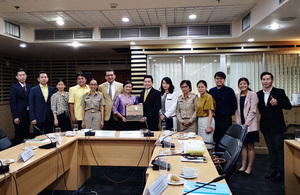Launch of a feasibility study of using blockchain technology for IP management
British Embassy Bangkok in partnership with the Ministry of Commerce and Thammasat University have launched a project for feasibility study on blockchain solutions for intellectual property management.

Margaret Tongue, Deputy Head of Mission, British Embassy Bangkok said:
The UK believes strongly in open markets underpinned by robust institutions and processes. As a disruptive technology, blockchain has the potential to revolutionise many day-to-day economic interactions. Blockchain is an inherently transparent, tamper-proof and decentralised way of recording data. It can help to build trust, reduce transaction costs and eliminate corruption in economic interactions. We believe Blockchain has tremendous potential if used in IP registry. It can help to speed up the IP registration processes, improve transparency, increase commercialisation and strengthen IP protection. We are proud to support the Thai Ministry of Commerce and Thammasat University to take this forward.
Pimchanok Vonkorpon, Director General of Trade Policy and Strategy Office (TPSO) said:
The blockchain is a decentralised ledger technology that can diminish costs by removing intermediaries. Blockchain can increase the efficiency of intellectual property (IP) management by facilitating and speeding up IP registration procedures. It also provides a time-stamped record that offers reliable proof of IP ownership. In addition, smart contracts on blockchain could assist in the sale and licensing of intellectual property rights.
The project, funded by the FCO Global Britain Enabling Fund, aims to study potential use cases of blockchain technology in intellectual property (IP) management in Thailand. We hope the outcome of this collaboration will provide a set of recommendations to the Government of Thailand on a potential use and benefits of blockchain technology as a new solution for IP rights management.